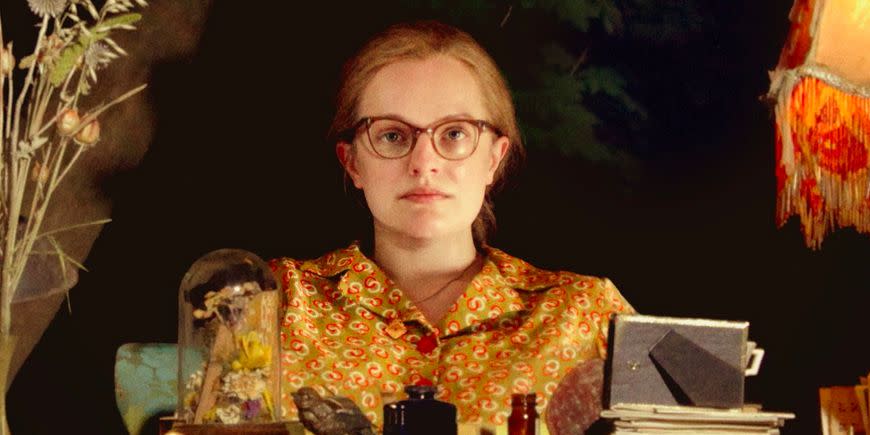The True Story Behind Shirley

If you're in the mood for a gripping, psychologically unsettling drama this weekend, look no further than Shirley, which is now available on Hulu, iTunes, and Amazon Prime.
Elisabeth Moss stars as Shirley Jackson, the author of The Haunting of Hill House among many other celebrated works. And though the film is loosely based on real life—following Jackson's life in her later years with her husband, literary critic Stanley Edgar Hyman (Michael Stuhlbarg) at their home in Vermont—it's far from a traditional biopic, instead playing on the horror tropes of Jackson's own work to lure viewers inside the author's brilliant but troubled mind.
If you're curious about the fact vs. fiction of it all, here's a quick primer on the real story behind Shirley.
Shirley was unappreciated in her lifetime.
Jackson is now widely known, and acclaimed, as the author of the novels The Haunting of Hill House and We Have Always Lived in the Castle. A classic haunted house story with a deeply emotional core, The Haunting of Hill House has been adapted for the screen several times, most recently as the hit Netflix series from 2018. Meanwhile, We Have Always Lived in the Castle, a psychological thriller about two sisters who survived their family's mass poisoning under mysterious circumstances, was adapted into a movie and released last year starring Alexandra Daddario and Taissa Farmiga.
But in her own lifetime, Jackson struggled to be taken seriously as a writer, instead making most of her income writing cheerful articles about housekeeping and motherhood for women's magazines. She was the main breadwinner for the family, since her husband made a relatively low salary as a professor at Bennington College in Vermont.
One short story that plays a prominent role in Shirley is 1948's The Lottery, which is seen being read by Rose (Odessa Young), a young housekeeper hired by Stanley to take care of domestic duties in light of his wife's paralyzing depression. In real life, Jackson wrote The Lottery in a single morning.
Many of her novels blur the line between fantasy and reality.
Without giving anything away, Shirley draws on the unstable nature of Jackson's protagonists as Moss's Jackson develops an intense, unhealthy relationship with Rose, who is fascinated by her and her work. As Jackson begins working on her novel Hangsaman, it becomes clear that the novel's protagonist has a lot in common with Rose.
Director Josephine Decker told The Guardian that she aimed to evoke the atmosphere of Jackson's writing, so that "the experience of meeting her would feel like you were actually in one of her novels or her short stories."
Her husband was openly unfaithful.
Rage, gaslighting, and female oppression are some of the themes that pervade Jackson's work, which makes sense the more you learn about her domestic life. According to The New York Times, Jackson and Hyman started out thinking of each other as "soul mates," but their marriage soured over the years in part because he left all the domestic work and childcare to her, and in larger part because he "objected to monogamy on philosophical grounds." He was openly and continuously unfaithful, often with former students, though he mostly adhered to a "hundred-mile rule" of carrying out his affairs far from home.
In a letter to her husband, Jackson recalled that he had once told her that she would never be lonely again once she married him, writing: "I think that was the first, the most dreadful, lie you ever told me."
She suffered from severe agoraphobia.
As depicted in Shirley, Jackson became a shut-in for long periods of time toward the end of her life. Soon after the publication of We Have Always Lived in the Castle in 1962—which would be her final work—Jackson suffered a breakdown and did not go outside for half a year, writing at the time that she had "written [herself] into the house," The New Yorker.
After two years, she began to recover and had aspirations for the future that included writing more fiction and leaving her husband. In a journal at the time, she wrote that she longed to be "separate, to be alone, to stand and walk alone, not to be different and weak and helpless and degraded." She also planned to write a different kind of novel as her next work: "Perhaps a funny book. a happy book … plots will come flooding when I get the rubbish cleared away from my mind."
Shirley died at the age of 48.
Tragically, Jackson didn't get to realize any of these dreams before she died suddenly from a heart attack in 1965. At the time of her death, she was working on two new novels, one of which, Come Away with Me, was posthumously published in an unfinished form by Hyman.
You Might Also Like


